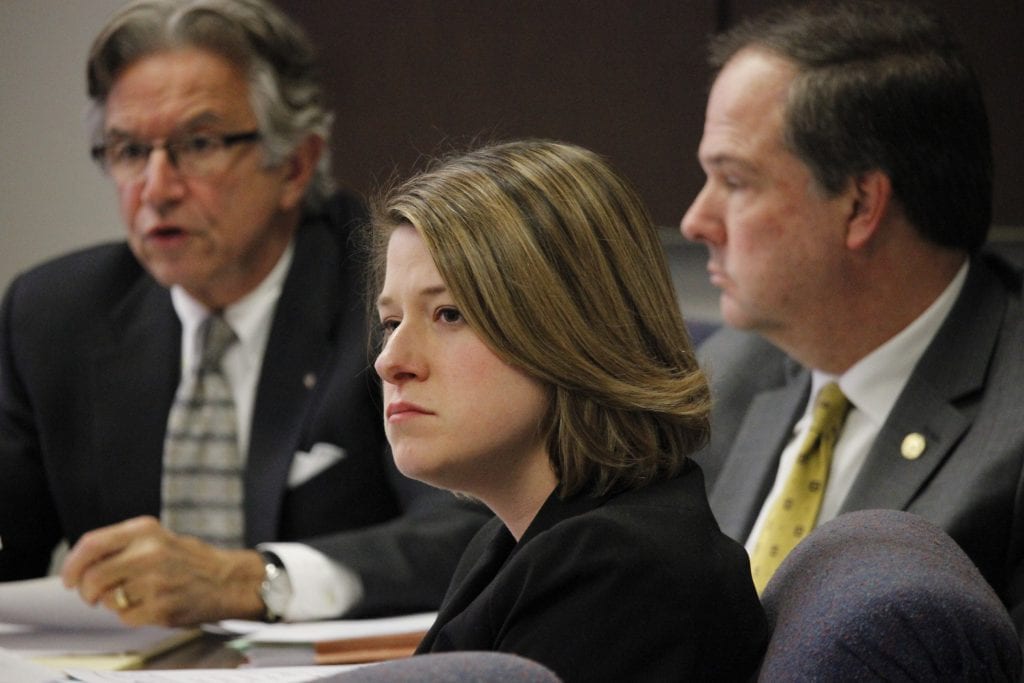St. Louis County Circuit Judge Thomas Albus issued a ruling Tuesday in a county-funded lawsuit that divided County Council members over who was the rightfully elected council chair: 1st District Councilwoman Rita Days, D-Bel Nor, or 5th District Councilwoman Lisa Clancy, D-Maplewood. Albus sided with Days and the current bipartisan majority of the council and rejected the county’s legal arguments.
Clancy, the council chair for 2020, appeared to be elected chair Jan. 5 on a 4-3 vote that included outgoing council member Rochelle Gray, after a Charter change said that new council members wouldn’t be sworn in until the second Tuesday of January instead of Jan. 1, as had been traditional. Those same members appeared to elect 6th District Councilman Ernie Trakas, R-Oakville, as vice chair. Trakas voted with the four to elect himself and Clancy.

But Gray’s successor, Shalonda Webb, joined with the three dissenting votes to call a special meeting the next week and elect Days as chair and Mark Harder as vice chair. With Gray off the council, 3rd District Councilman Tim Fitch of Fenton, Harder, Webb and Days form a bipartisan council majority.
They say that the council should have waited until the Jan. 12 meeting to allow Webb to have a say in council leadership.
Albus agreed in a ruling issued Tuesday, rejecting St. Louis County’s quo warranto petition and the legal reasoning of County Counselor Beth Orwick that Clancy and Trakas were the rightful chairs.
Clancy issued a statement that she would like to move forward without fighting the decision.
“I consider this matter settled, and I am glad to have it behind us. To me, this has definitely never been about disrespect for Councilwoman Webb or former Councilwoman Walton Gray. Or about race. Or about age,” said Clancy, who is white. Days, Webb and Gray are black.
Clancy continued, “It was – and remains – about ensuring the independence of county government from ideology, and about following the rules. With this clarification from the court, we have what we need to put this issue behind us — and that is what I intend to do.”
The council majority released a statement signed by Days, Harder, Fitch and Webb that said, “The Council is pleased that the Court recognized the validity of the January 15, 2021 election, the only vote that included Councilmember Shalonda Webb, who overwhelmingly defeated former Councilmember Gray for the 4th District Council seat in November. Thus, the January 15 vote of Days and Harder represents the will of the majority of the duly elected Councilmembers for the 2021 calendar year and the constituents they represent. The undersigned are glad to have this dispute behind them and are ready to move forward with the important business before the Council.”
The issue has divided the council for the first months of the year. Although Clancy agreed to allow Days to serve as acting chair after a few initial meetings in which they talked over each other trying to chair the meeting, the conflict on the council has continued with sometimes-tense discussions over whether the county would fund Webb’s outside attorney or whether Days could take away Clancy and Trakas’ positions as heads of committees.
In the meetings held during the dispute, Albus noted there has been “confusion and dissention (sic) at Council meetings with two members of the Council professing a right to preside and occupy the role of Chair and two members of the Council professing a right to occupy the role of Vice-Chair.”
The case saw the administration of County Executive Sam Page, represented by Orwick, align with Clancy and Trakas, who in their official capacity joined with the county to sue Fitch, Days, Webb and Harder. Orwick filed for a quo warranto, the same legal maneuver to remove a public official from office or position that the county once pursued unsuccessfully against Trakas.
The dispute arose after voters approved a change to the county Charter that said new council members are sworn in on the second Tuesday of the year, instead of on Jan. 1 as had been tradition.
The opinion of the administration under former County Executive Steve Stenger was that public officials automatically assumed the new position, even without being officially sworn in, at the stroke of midnight on New Year’s Eve. That led to Days’ predecessor as 1st District councilwoman, Hazel Erby, taking the oath of office at a New Year’s Eve party held by Prosecuting Attorney Wesley Bell, for example.
But Clancy and Trakas, backed by a multi-page legal opinion from Orwick, contended that Gray still held the office until Webb officially was sworn in since the Charter amendment changed council terms to run from the second Tuesday of the year to the second Tuesday of the fourth year.
That reasoning would have allowed Gray to take part in the Jan. 5 vote to elect Clancy as chair and Trakas as vice chair. The Charter also stated that the vote for council chair has to take place in the first meeting of the year, although former 3rd District Councilwoman Colleen Wasinger, R-Huntleigh, argued in an op-ed that the Charter conflict could have been easily avoided by delaying the first meeting of the year to Jan. 12, the second Tuesday.
Albus denied the quo warranto, writing that Gray’s “holdover status under the Missouri Constitution ended before the January 5, 2020 vote,” so that vote was not valid. Days and the other three council members now in the majority argued that the Missouri Constitution limits county officeholders to four-year terms, so Gray’s term could not be extended by 12 days. But Orwick and the county argued that the Constitution’s “holdover clause” calls for current officeholders to continue to stay in office until a successor can take their place to allow for representation of the public and that the holdover clause trumped the four-year clause.
In the ruling, Albus agreed that the holdover clause applied to Trakas and 2nd District Councilwoman Kelli Dunaway, D-Chesterfield, because they were both the incumbents and the ones taking office.
But since Gray would be replaced by Webb, the judge wrote that the holdover clause only allows an incumbent to stay on until a successor is “duly elected or appointed and qualified.” Webb had been elected and Albus interpreted qualified to mean that the new council member only had to take the oath of office, which she did and tried to submit to County Clerk Diann Valenti, who did not accept it.
Taking the oath of office cuts off the previous officeholder’s holdover rights, Albus ruled.
“Councilperson Webb could do nothing to cut off the holdover rights of Councilperson Gray, whom she defeated in her party’s primary months earlier and whose term of office had by all accounts ended before the important vote for Chair and Vice-Chair,” Albus wrote. “To allow the County to amend its Charter and change the effective date of officers’ terms while providing no practical way for an elected successor to cut off an incumbent’s right to hold over would allow it to effectively violate the Missouri Constitution’s proscription against terms of more than four years.”
This is a breaking news story. Check back for updates.
Read the lawsuit below.
